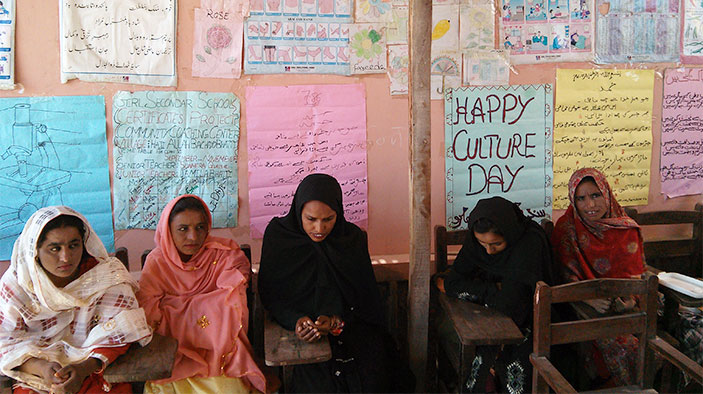Girls Going to School Against the Odds in Pakistan
October 09, 2013
The transition from primary school to middle school is a difficult one for children all across the world. It is especially difficult if you happen to be born in rural Sindh province in Pakistan. For the female residents of the town of Thatta, chances are that they will never make it beyond grade 5—if they are lucky enough to go to school in the first place. The schools available are few and far between. And many parents in conservative Pakistan would not allow their girls to walk alone to and from school. On top of that, parents who are employed as daily wage laborers or as bonded labor on farms don’t have the time or luxury to walk their girls to school.

As a result, most women in Pakistan are denied the chance of an education. Currently, Pakistan has one of the lowest female enrollment rates in the world. Even though the benefits of educating girls have been demonstrated to have substantial impacts on family health and financial outcomes, many Pakistani parents don’t see the merit of letting their girls go to school.
In Thatta, many women and girls wanted to go to school but had no school to go to. Recognizing the need for girls schools that provide education beyond class 5, a local organization called Sindh Radiant Organization (SRO) applied to Ilm Ideas with the idea of setting up community learning centers for girls who had dropped out of school after grade 5.
Ilm Ideas, a U.K. Department for International Development (DFID) project, is implemented by DAI. Through grant funds, the project supports organizations demanding accountability and promoting innovation in Pakistan’s education sector. The funds support activities nationwide, in cooperation with Cambridge Education. With funding from Ilm and the support of the local community, SRO set up 18 community learning centers in spaces donated by the community or by utilizing underutilized public spaces. The response was overwhelming. Soon girls from across the district were lining up to be enrolled.
Taught by local teachers who were trained with support from Ilm Ideas, the community learning centers have developed as safe spaces for learning and also for friendships and support networks to develop. An estimated 500 girls between the ages of 11-17 have been registered with nearby government schools and are now on their way to completing their secondary education.
To learn more about grants available from Ilm, follow the project on Twitter or visit the site.
RELATED CONTENT:
DAI Leader Supports Safe Haven Initiative for Ukrainian Women Entrepreneurs
A DAI Chief of Party from a project in Georgia is volunteering his time to help women entrepreneurs in Ukraine. Mark McCord, who leads the USAID Economic Security Program in Georgia has partnered with representatives of a Silicon Valley accelerator called United Market Access Center and with StartupGrind Georgia to launch the Safe Haven initiative—in coordination with a DAI-led sister project in Ukraine, the Economic Resilience Activity.
Read More